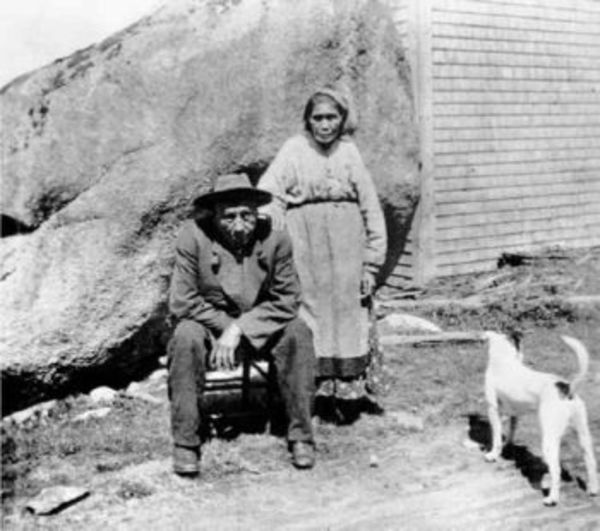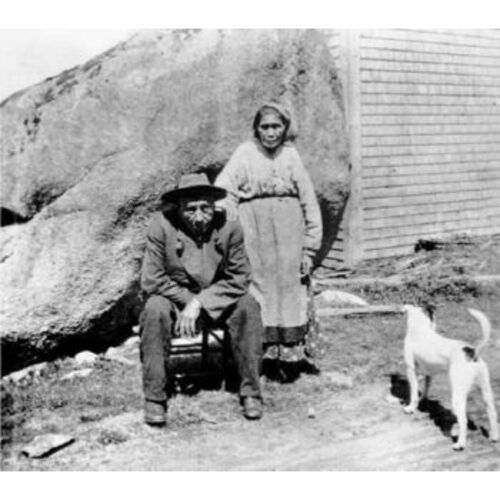
Source: Link
COPE, JOHN NOEL (Newell) (Bolmoltie, Bowlmawltie, Paul Martin), Micmac guide and hunter; b. April 1847 in Sheet Harbour, N.S., son of Francis Cope (Doadaran Cope, Bernard Cope Nowlan) and Mollie (Marie) —; m. Fanny —; d. 25 Aug. 1918 in Upper Musquodoboit, N.S.
John Noel Cope’s father was said to be a descendant of Jean-Baptiste Cope*, a noted Micmac leader of the 18th century. Francis drowned after falling out of his canoe while suffering a stroke or a seizure. John’s mother was a white woman, who, it is said, had been abducted from her family in New Brunswick as a baby. She made a living catching bear cubs and selling them as pets to the officers of the British garrison at Halifax. Mollie had walked 70 miles from Sheet Harbour to Pictou at the age of 14 in order to be married to Francis by the priest; her epic journey included carrying someone else’s two-year-old son on her back, to have him baptized.
Cope’s life centred on hunting. Francis had been a famous hunter who once carried 60 moose skins in his canoe to Halifax. John Noel surpassed even him, becoming a legendary figure in his own lifetime because of his achievements as a hunter and trapper. He was born with a withered arm, but this in no way slowed him down. Cope’s most famous exploit was the tracking, killing, butchering, and selling of 25 moose in one week. Harry Piers*, curator of the provincial museum, recorded that Cope had gone one Monday to the reserve at Ship Harbour Lake and shot ten moose. He then went to Musquodoboit and offered to get moose for two cents a pound for a white man, who would sell it. Returning to the woods by the reserve, Cope shot 15 more moose in four days. Piers added that he was the only man ever known to have killed 25 moose in one week, and that he said he could have shot more.
Even though his feat was never duplicated, Cope appears to have maintained his good reputation as a hunter and tracker. One winter, probably in 1878, he killed 18 moose, selling the meat to the Fifteen Mile Stream gold-mining camp. He was then camping at Indian Rips at the head of Hunting Lake on Liscomb River.
John Noel Cope’s life illustrates how traditional Micmac turned their skills at hunting into a business by becoming suppliers of meat. It was a way of life that was not to last very much longer. Cope died well known, the final blaze of brilliance of generations of Micmac men who had lived solely by the hunt. His obituary reads, “He was a big man, of unprepossessing appearance, but a genuine Indian in all respects.”
A photograph of John Noel Cope and his wife is in the collections of the Nova Scotia Museum, Halifax (19.53/4806/N-5573).
Nova Scotia Museum, Accession books, II, no.4806; Printed matter files, Harry Piers notes, 10 Jan. 1917; genealogies, I, nos.5, 29, 65. PANS, MG 1, 2867, no.2A: 26–27. Novascotian (Halifax), 6 April 1846. The old man told us: excerpts from Micmac history, 1500–1950, comp. R. H. Whitehead (Halifax, 1991).
Cite This Article
Ruth Holmes Whitehead, “COPE, JOHN NOEL (Newell) (Bolmoltie, Bowlmawltie, Paul Martin),” in Dictionary of Canadian Biography, vol. 14, University of Toronto/Université Laval, 2003–, accessed April 23, 2025, https://www.biographi.ca/en/bio/cope_john_noel_14E.html.
The citation above shows the format for footnotes and endnotes according to the Chicago manual of style (16th edition). Information to be used in other citation formats:
| Permalink: | https://www.biographi.ca/en/bio/cope_john_noel_14E.html |
| Author of Article: | Ruth Holmes Whitehead |
| Title of Article: | COPE, JOHN NOEL (Newell) (Bolmoltie, Bowlmawltie, Paul Martin) |
| Publication Name: | Dictionary of Canadian Biography, vol. 14 |
| Publisher: | University of Toronto/Université Laval |
| Year of revision: | 1998 |
| Access Date: | April 23, 2025 |



